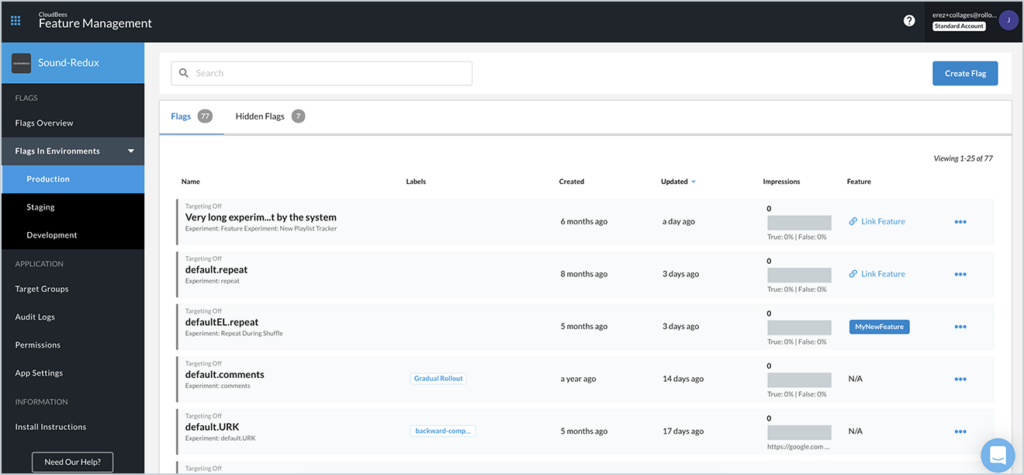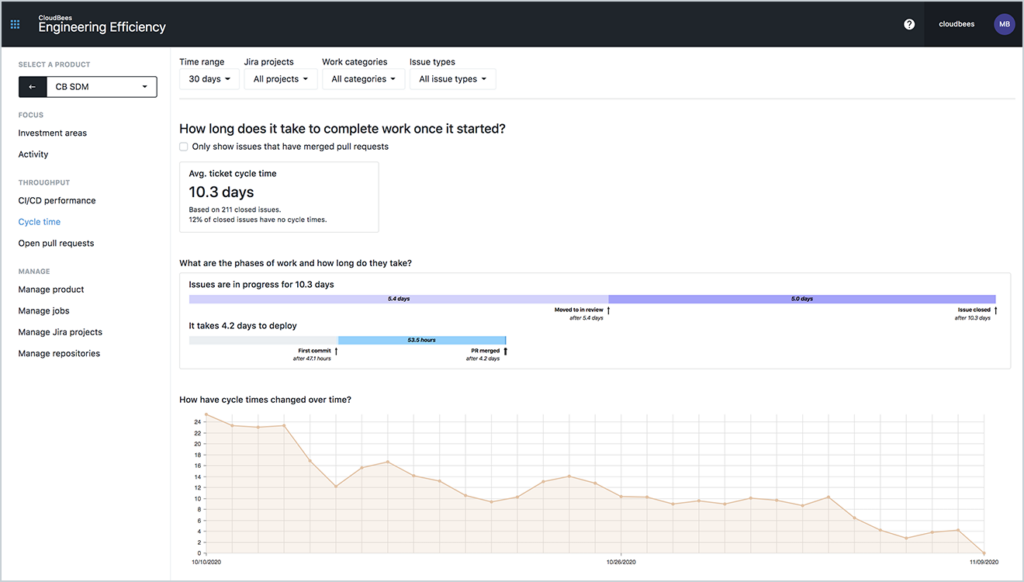As someone who's been in the automated delivery tech sphere for decades, I've seen software come and go. Rest assured, this comprehensive review of CloudBees will provide you with the information you need to make an informed decision.

CloudBees Software Product Overview
CloudBees (CloudBees CI) is an automated software delivery that facilitates the integration and delivery of software projects. Primarily, developers and DevOps teams use this tool. It offers a streamlined approach to continuous integration and continuous delivery (CI/CD), resolving the pain of manual code deployment. Docker, Jenkins, Kubernetes, Amazon EC2, and Microsoft Azure are some of the popular tools that integrate with CloudBees.
CloudBees software delivery platform shines with features like real-time analytics, robust scalability, and deep integration capabilities. Oversee, deploy, and assess features on a large scale. Also, orchestration of your software delivery process from end-to-end is very easy.
Pros
- Real-time Analytics: CloudBees provides instant data insights, making it easier to measure performance and make adjustments.
- Robust Scalability: The platform can grow with your team, so you won't have to switch solutions as your needs evolve.
- Deep Integrations: CloudBees meshes well with other tools, reducing the need for multiple platforms and streamlining the development process.
Cons
- Learning Curve: The feature-rich environment may overwhelm new users.
- Resource Intensity: It can be heavy on system resources, impacting performance in smaller environments.
- Cost Barrier: While not discussing pricing, it's worth noting that the full feature set might be overkill for small projects or solo developers, making it less cost-effective for them.
Expert Opinion
In my judgment, CloudBees platform holds its ground when lined up against other automated delivery tech software. Feature-wise, it outperforms many competitors, particularly with its analytics and deep integrations.
However, its resource intensity and complexity can be a hurdle for smaller teams or individual developers. If you're part of a medium to large development or DevOps team and you need a tool that can scale with you, CloudBees should be on your shortlist.
CloudBees Review: The Bottom Line
CloudBees distinguishes itself with real-time analytics and a level of scalability that many other tools in the space lack. Its capability to deeply integrate with various other platforms also sets it apart. These features make it a robust, well-rounded offering for those looking to enhance their CI/CD pipelines.
CLoudBees Deep Dive
Product Specifications
- Continuous Integration (CI) - Yes
- Continuous Deployment (CD) - Yes
- Real-Time Analytics - Yes
- Version Control - Yes
- Workflow Automation - Yes
- Build Automation - Yes
- Code Review - Yes
- Test Automation - Yes
- Docker Support - Yes
- Rollback Features - Yes
- User Role Management - Yes
- Task Scheduling - Yes
- Performance Monitoring - Yes
- Artifact Management - Yes
- Remote Deployment - Yes
- Scalability - Yes
- Multi-Cloud Support - Yes
- Security Compliance - Yes
- Scriptless Automation - Yes
- Collaboration Features - Yes
- Integration with Popular IDEs - Yes
- Self-Service Portals - Yes
- Git Integration - Yes
- Configuration Management - Yes
- Release Tracking - Yes
CloudBees Feature Overview
- Continuous Integration (CI): CloudBees enables quick building and testing of code. This leads to faster development cycles.
- Real-Time Analytics: CloudBees offers real-time data, making performance tracking a breeze.
- Workflow Automation: Customizable workflows help automate repetitive tasks.
- Build Automation: CloudBees automates the building process, freeing developers from this manual task.
- Code Review: CloudBees integrates code review tools, ensuring quality before deployment.
- Test Automation: The platform can run automated tests for you. This results in higher code quality.
- User Role Management: CloudBees allows precise control over who has access to what.
- Task Scheduling: Scheduling future tasks is easy. This keeps your project on track.
- Performance Monitoring: CloudBees helps monitor performance, ensuring your system runs efficiently.
- Security Compliance: With CloudBees, you get features aimed at maintaining high security standards.
Standout Functionality
- Real-Time Analytics: Unlike many other tools, CloudBees offers actionable real-time analytics. This enables you to track performance instantly.
- Workflow Automation: CloudBees provides highly customizable workflow automation that isn't tied to a single type of process or methodology.
- Security Compliance: Many tools offer security features, but CloudBees integrates compliance checks directly within the CI/CD pipeline.
Integrations
CloudBees integrates natively with popular tools like GitHub, Docker, and Kubernetes. These integrations help in building, deploying, and managing applications. An API is also available, offering functionalities like custom integrations and data manipulation. Additionally, there are several add-ons to extend the platform's capabilities, such as advanced reporting tools.
CloudBees Pricing
Pricing varies based on the features and number of users. Generally speaking, the pricing is competitive when considering the rich feature set.
- Basic Tier: $50/user/month (min 5 seats) – Offers CI/CD and basic analytics features.
- Pro Tier: $100/user/month (min 5 seats, billed annually) – Includes advanced analytics and performance monitoring.
Note: All tiers have a + $49 base fee per month.
Ease of Use
CloudBees offers a UI that's rich in features but can be overwhelming. The onboarding process is smooth, but the plethora of options might confuse new users. Navigation can be complex due to the deep feature set.
Customer Support
CloudBees offers multiple channels for support, including live chat and documentation. However, users often report slow response times, particularly during off-hours. This lag can be frustrating when immediate help is needed.

CloudBees Use Case
Who would be a good fit for CloudBees?
If you're part of a medium to large-sized development or DevOps team in an industry like tech, finance, or healthcare, CloudBees could serve you well. The platform is particularly beneficial for teams that need a robust CI/CD solution with advanced features like real-time analytics and customizable workflow automation.
These are the kinds of teams that often turn into loyal, avid customers—they need to manage complex, large-scale projects and CloudBees offers the functionality and scalability to handle that.
Who would be a bad fit for CloudBees?
Smaller teams, solo developers, or startups with limited resources may find CloudBees overwhelming or too expensive for their needs. These customers are often the most disappointed because the platform's complexity and cost don't align well with smaller-scale projects.
Industries or sectors that don't require extensive CI/CD pipelines or complex workflow automations, such as small e-commerce businesses or content creators, might find CloudBees excessive for their simpler requirements.
CloudBees Review FAQs
What is CloudBees primarily used for?
CloudBees is used mainly for continuous integration and continuous deployment (CI/CD), helping to automate software development and delivery processes.
Who typically uses CloudBees?
Medium to large-sized development or DevOps teams in industries like tech, finance, and healthcare often use CloudBees.
Is CloudBees suitable for small teams or solo developers?
Generally, CloudBees may not be the best fit for small teams or solo developers due to its complexity and cost.
Does CloudBees offer real-time analytics?
Yes, CloudBees offers real-time analytics to help teams measure performance and make data-driven decisions.
Can I customize the workflow in CloudBees?
Yes, CloudBees offers highly customizable workflow automation features.
Is CloudBees resource-intensive?
The platform can be heavy on system resources, which might impact performance in smaller environments.
Does CloudBees offer customer support?
CloudBees provides multiple channels of customer support, including live chat and documentation, but response times can be slow.
Are there native integrations available for CloudBees?
As a matter of fact, CloudBees natively integrates with popular tools like GitHub, Docker, and Kubernetes to help in application development and management.
CloudBees Alternatives
- Jenkins: Often cited as an open-source alternative to CloudBees, Jenkins is ideal if you want a cost-effective solution without compromising too much on customizability.
- GitLab: GitLab stands out for its native integration with Git repositories, making it better for teams that rely heavily on Git for version control.
- CircleCI: If you're working in a smaller team and want a simpler, more intuitive interface, CircleCI might be a better option for you.
Check out this article to discover other continuous delivery tools.
CloudBees Company Overview & History
In fact, CloudBees is a company specializing in providing CI/CD solutions to streamline software development. Popular with medium to large-sized companies in sectors like tech, finance, and healthcare, it is a private entity currently headquartered in San Jose, California.
Owned by its shareholders and led by a strong board including notable industry veterans, the company's mission statement revolves around empowering businesses to deliver software more efficiently. Since its inception, CloudBees has marked several milestones, such as strategic acquisitions and the launch of groundbreaking features in the CI/CD space.
Summary
So, after thoroughly reviewing CloudBees, it's clear that the platform offers a robust set of features ideal for medium to large-sized DevOps or development teams with complex CI/CD requirements. Its downsides, including cost and complexity, might make it less appealing for smaller teams.
If you fall into its target user base, CloudBees could well be the solution you need for automating your delivery pipeline. Feel free to comment below and share your experiences with CloudBees or any alternatives you've tried.
